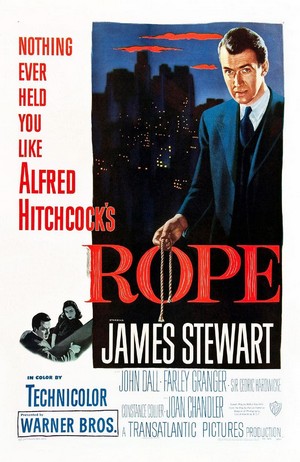
Rope (1948)

Raiting: ![]() 7,8 /10
7,8 /10
Genre: Crime
Director: Alfred Hitchcock
Stars: James Stewart, John Dall and Farley Granger
Country: United States
Release date: 11 March 1948
Length: 80 minutes


Raiting: ![]() 7,8 /10
7,8 /10
Genre: Crime
Director: Alfred Hitchcock
Stars: James Stewart, John Dall and Farley Granger
Country: United States
Release date: 11 March 1948
Length: 80 minutes